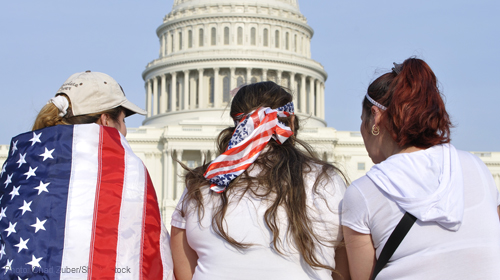
Leopolda Zumaya was working as an apple picker in Pennsylvania when he fell from a tree, breaking his leg and leaving him with permanent nerve damage and a chronic pain disorder. A treating physician said Mr. Zumaya's injuries were among the worst he'd seen, but when his boss learned Mr. Zumaya could not return to work, he ejected Mr. Zumaya from the farm labor camp where he lived and refused to pay benefits. More than eight years later, Mr. Zumaya continues to suffer chronic pain and struggles to walk.
Every day in the United States, workers in low-wage jobs risk their health and their lives providing basic services in hazardous conditions, with little protection for themselves or their families when they are injured on the job. A recent found that "employers are paying the lowest rates for workers' comp insurance since the 1970s" with cutbacks in benefits "so drastic in some places that they virtually guarantee injured workers will plummet into poverty."
For undocumented workers like Mr. Zumaya, who comprise over five percent of the U.S. workforce, requesting compensation and medical care after a work injury is often futile and can result in retaliation. Workers who have requested their wages, reported labor abuses, sought compensation for work injuries, or reported sexual harassment by employers have been arrested and deported by U.S. immigration officers when employers retaliate. While immigration reform and President Obama's hang in the balance, millions of undocumented workers remain in a vulnerable and exploited position, doing some of the most dangerous work in the country but with limited safeguards or recourse when injured.
Under a 2011 Department of Homeland Security on immigration enforcement, undocumented workers qualify for prosecutorial discretion. That means they shouldn't be pursued for arrest and deportation if they are victims of workplace abuse or if they are attempting to enforce their labor rights. Nonetheless, some employers continue to threaten undocumented workers and report them to immigration authorities when they pursue their rights.
And despite the DHS memo, over the past several years, legal protections for undocumented workers have been declining.
In 2002, in Hoffman Plastic Compounds v. NLRB, the U.S. Supreme Court held that an undocumented worker, illegally fired for participating in protected union activities, could not recover back pay – i.e., the wages they would have earned if they had not been fired. While some states, like , do recognize greater labor rights for undocumented workers, several others were emboldened by the Hoffman decision to limit or even eliminate core workplace protections, like compensation for injuries. The expansion of these laws has further jeopardized the welfare of a growing underclass of exploited workers, hired for hazardous, low-wage jobs but with limited ability to protest and report abuses and to see recompense when those abuses occur.
In response to this downward spiral, the ¿œ∞ƒ√≈ø™Ω±Ω·π˚, the National Employment Law Project, and the University of Pennsylvania's Transnational Legal Clinic filed a petition in 2006 with the Inter-American Human Rights Commission, challenging the U.S. government's failure to protect our clients ‚Äì and millions like them ‚Äì from exploitation and discrimination in the workplace. Human rights law recognizes the rights of all workers, regardless of their legal status, to be treated humanely and justly, without discrimination.
On March 16 – almost eight years later – our clients are finally getting a hearing before the commission and a chance to vindicate their human right to fair treatment. Their stories, like those of millions of other undocumented workers in the United States, remind us of what's at stake for workers who support our economy and undertake some of our most dangerous jobs but are laboring in the shadows.
And while we wait for the promised immigration reform and stronger worker protections, we call upon the U.S. government to ensure that undocumented workers are not deported for asserting rights.
Learn more about workers' rights and other civil liberty issues: Sign up for breaking news alerts, , and .

